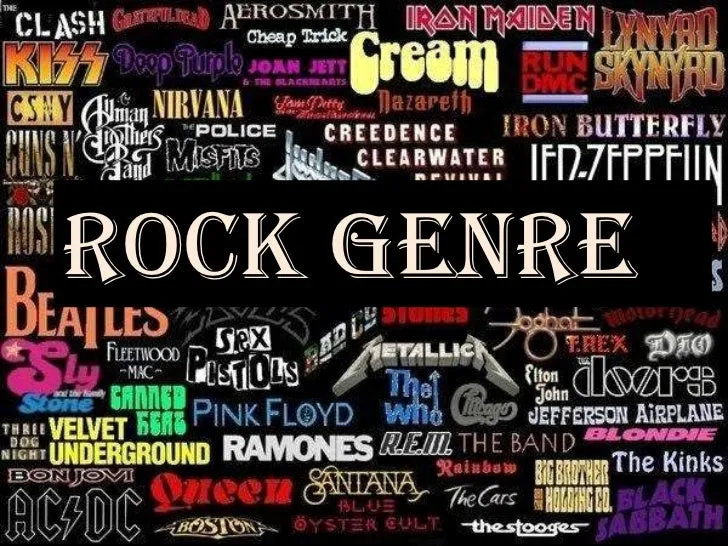
The rock genre refers to a category of music that originated in the 1950s and is characterized by its use of electric instruments, strong emphasis on rhythm, and often, a focus on lyrics that speak to themes of love, rebellion, and personal freedom.
Rock music has evolved over the years and has branched out into many sub-genres, including:
- Classic Rock: This sub-genre refers to the original rock music of the 1950s and 1960s, characterized by bands like The Beatles, [The Rolling Stones, and Led Zeppelin.
- Hard Rock: This sub-genre is characterized by its heavy use of distorted electric guitars, strong drumming, and often, aggressive vocals. Bands like Guns N' Roses, Van Halen, and AC/DC are examples of hard rock.
- Heavy Metal: This sub-genre is characterized by its use of aggressive and powerful soundscapes, fast tempos, and often, growling vocals. Bands like Black Sabbath, Metallica, and Slayer are examples of heavy metal.
- Punk Rock: This sub-genre is characterized by its fast tempo, rebellious attitude, and often, politically-charged lyrics. Bands like The Ramones, The Clash, and Green Day are examples of punk rock.
- Alternative Rock: This sub-genre emerged in the 1980s and 1990s and is characterized by its rejection of mainstream rock music conventions. Bands like Nirvana, Radiohead, and Foo Fighters are examples of alternative rock.
- Indie Rock: This sub-genre is characterized by its DIY ethos, often featuring bands that self-produce and release their own music. Bands like Arcade Fire, The Strokes, and Vampire Weekend are examples of indie rock.
- Progressive Rock: This sub-genre is characterized by its use of experimental sounds, long compositions, and conceptual themes. Bands like Pink Floyd, Yes, and King Crimson are examples of progressive rock.
These are just a few examples of the many sub-genres within the rock genre. Each sub-genre has its own unique sound and style, but they all share a common thread - a focus on electric instruments, strong rhythms, and often, a rebellious attitude.
History
The history of rock music is a rich tapestry woven from diverse influences and fueled by social change. Here's a journey through its key eras:
Roots (1940s-1950s):
- Seeds of rock sprouted in the fertile ground of African American music, particularly blues and rhythm and blues. artists like Chuck Berry, Sister Rosetta Tharpe, and Little Richard infused these styles with energy and attitude.
- Country music also played a role, with crossover figures like Elvis Presley blending its melodies with the bluesy grit of rock and roll.
- The term "rock and roll" itself emerged in the mid-50s, initially met with resistance due to its association with Black culture and its perceived suggestiveness.
Golden Age (1960s):
- Rock and roll exploded in popularity, led by British Invasion bands like The Beatles, The Rolling Stones, and The Who. They incorporated diverse elements like pop melodies, complex arrangements, and introspective lyrics.
- In the US, subgenres like psychedelic rock (Pink Floyd, Jimi Hendrix) and folk rock (Bob Dylan, The Byrds) flourished, exploring social and political themes alongside sonic experimentation.
- Rock became a powerful voice for youth counterculture, addressing issues like war, civil rights, and societal norms.
Diversification and Experimentation (1970s-1980s):
- Rock fragmented into a kaleidoscope of subgenres. Hard rock (Led Zeppelin, Black Sabbath) pushed boundaries with heavier sounds and darker themes.
- Punk rock (The Ramones, Sex Pistols) emerged as a raw, rebellious reaction against mainstream rock, advocating for social change.
- Progressive rock (Pink Floyd, Genesis) explored extended compositions and complex instrumentation. Glam rock (David Bowie, T. Rex) embraced theatricality and androgyny.
- Disco's danceable rhythms also influenced rock, leading to genres like funk rock (Talking Heads) and new wave (Blondie, The Police).
Alternative Era and Beyond (1990s-Present):
- Grunge (Nirvana, Pearl Jam) emerged from the Seattle scene, bringing angst and introspective lyrics back to rock's forefront.
- Alternative rock (R.E.M., Radiohead) continued to diversify, incorporating elements of indie rock, electronica, and other genres.
- Rock continues to evolve in the 21st century, with subgenres like emo, pop-punk, and indie rock finding new audiences. Rock's influence also permeates other popular music genres, highlighting its lasting impact.
Throughout its history, rock music has been a powerful force for cultural expression, reflecting and shaping societal trends. Its diverse branches and continuous evolution make it a fascinating and ever-relevant genre.